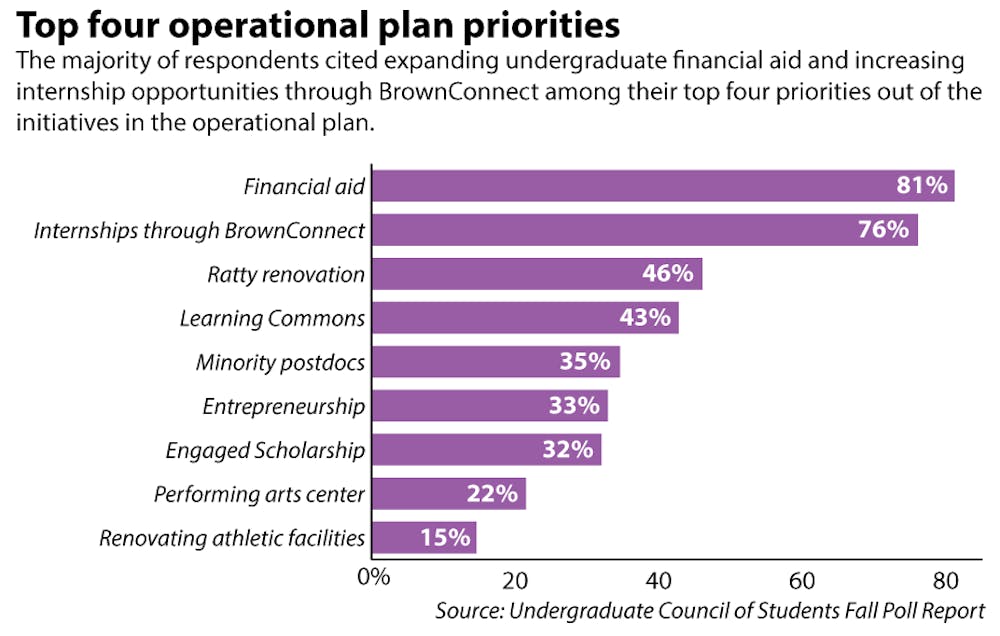Mental health emerged as a larger priority than last year in the Undergraduate Council of Students Fall Poll, with nearly 40 percent of respondents citing expanding mental health services as their top concern. This marks a 10.8 percent rise from last year and moves mental health into second place among concerns, behind financial aid and trailed by sexual assault policy reform.
Approximately 46 percent of the undergraduate student body — 2,888 students — took part in the poll, marking the largest ever turnout. “This representativeness is really important and speaks to the engagement of our student body,” said UCS President Sazzy Gourley ’16.
“There’s been increased dialogue about the need for expansion (of mental health resources) as a result of the events on campus last year,” Gourley said, citing several publicized and private suicides in the Brown community.
When considering mental health initiatives, students most frequently cited increasing staffing at Counseling and Psychological Services, with 29.9 percent of respondents ranking it as their top priority in this realm.
Sexual assault policy reform may have fallen behind mental health because of perceived progress in this area, as the Title IX Office has adopted several recommendations in the Task Force on Sexual Assault’s final report, Gourley said. “We’ve begun reforming sexual assault policies stemming from the report, so it’s natural to see a slight decrease in the prioritization of sexual assault policy reform,” he said.
Improving undergraduate financial aid remained steady as the most-selected option. Approximately 54.3 percent of respondents selected that issue as their top priority, a decline of just 1.7 percent from last year. Within the topic, a vast majority of respondents chose lowering the financial burden for domestic, middle-income families over expanding need-blind admission to international, transfer and resumed undergraduate education students as a focal point for the allocation of funds. The gap between the two focal areas has increased by more than 18 percent over the last two years.
The section of the poll addressing President Christina Paxson’s P’19 operational plan asked respondents to select their top four priorities from the initiatives in the plan. In keeping with the overall results of the poll, 81.2 percent of respondents chose expanding undergraduate financial aid as one of their important initiatives, and 76.1 percent chose expanding internships through BrownConnect, the University’s internship search and networking site. The renovation of the Sharpe Refectory was a distant third, selected by 46.1 percent of respondents.
Creating postdoctoral fellowships for underrepresented minority faculty came in fifth overall at 34.6 percent. But the level of selection was far higher when broken down demographically, with 56.8 percent of black students, 52.7 percent of Native American students and 42.9 percent of Latino students identifying this initiative as important.
The cost of textbooks stood out as a primary financial area of concern, with 73.8 percent of respondents on financial aid and 84 percent of those without financial aid ranking it as one of their three most important areas of action. Respondents in the former demographic indicated a larger interest in eliminating or reducing the summer earnings expectation. Fifty-one percent of those on financial aid identified this option, compared with just 35.5 percent of those without aid.
“It’s significant that students on and off financial aid have the exact same order of priorities,” said UCS Vice President Alana Bhatla ’16.
“We’re using the data from this question to inform specific initiatives directly targeting these concrete financial obstacles,” Gourley said.
A stark divide emerged between students affiliated with Greek organizations and non-affiliates when it came to analyzing the recommendations of the Alcohol and Social Event Review committee. Targeted training and outreach programs for Greek organizations and varsity sports teams were favored by 53.8 percent of non-affiliated respondents and non-varsity athlete respondents, but just 37.6 percent of Greek organization members and 37.4 percent of varsity athletes. Similarly, just 7.8 percent of Greek organization members favored the prohibition of parties with alcohol in residential spaces, compared with 17.9 percent of non-affiliates.
As a result of the recommendations, a new policy is in place this year to staff first-year dormitories with graduate students on weekend evenings. This policy was not popular across the board — it found favor among just 13.9 percent of non-Greek affiliated and non-varsity athlete respondents, 10.3 percent of members of Greek organizations and 8.7 percent of varsity athletes.
Gourley said UCS is meeting with the Office of Residential Life this week to gather feedback on “evaluation mechanisms in place” and find out whether any changes will be made in response to the UCS Fall Poll results.
The topic of advising gave rise to a discrepancy between first-years and other students. When asked to rate their current advising experience from very bad to very good on a scale from negative three to three, the average for first-years was a 1.8, compared with 0.6 for sophomores, 0.7 for juniors and 0.6 for seniors. Both underclassmen and upperclassmen also graded the first-year advising experience more positively than the advising experience for other students.
The advising experience will remain a focus of UCS moving forward. “We need to continue to evaluate how sophomore and concentration advising are to be developed,” Bhatla said.
“We have a specific pilot document that we’re pushing forward with Dean of the College Maud Mandel to make sure there are avenues for students to offer constructive feedback on advising experiences,” Gourley said.
The poll also provided a space for open-ended responses. At least 25 respondents used this space to elaborate on the “dire need” for dormitory renovations, Bhatla said.
Many of these respondents specifically cited Perkins Hall and Graduate Center as in need of “broad-scale reform,” Gourley said.





